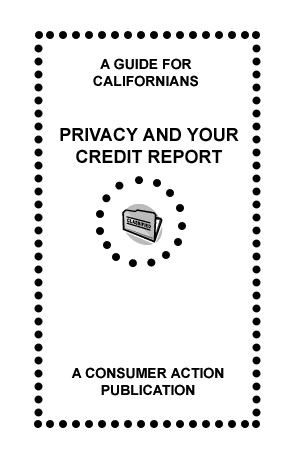Privacy and Your Credit Report
Our personal financial information is more easily available and far less secure in the computer age than it was in the days of old-fashioned filing cabinets. "Privacy and Your Credit Report" explains why the information contained in your credit report can, in the wrong hands, be used to abuse your privacy. It also explains how California residents have strong privacy rights with new laws and an office of privacy protection.

Our personal financial information is more easily available and far less private in the computer age than it was in the days of old-fashioned filing cabinets. Unfortunately, this has resulted in an increase in privacy abuses, credit fraud and a growing crime called identity theft in which an imposter applies for credit in the victim’s name.

California residents have strong privacy rights with new laws and the creation of the state Office of Privacy Protection (www.privacy.ca.gov) to provide information, advice and assistance on privacy issues to victims and the public. It also assists law enforcement by providing training and coordinating investigations and works to promote sound privacy protection practices in the business community.
Credit Reports
Of all the personal records in routine use by businesses, credit reports contain the most detail about you. If you’ve ever had a credit card, car loan or mortgage, you’ve probably got a credit report. Most information remains in your credit report for seven years. Bankruptcies appear on your credit report for up to ten years.
Your credit report contains a complete record of your credit history, including credit cards, car loans and mortgages. Credit reports contain facts to help businesses identify you, such as details of your past and present credit obligations, public records about you (if any) and a list of "inquiries"—the names of companies that have requested to see your credit report. A record of most inquiries remains on your report for two years.
Your credit report includes your name, Social Security number, date of birth and current and previous addresses, employers and telephone numbers as well as your credit account numbers and balances and payment history.
Credit reports are compiled by companies called credit reporting agencies. Three major national companies—Experian, Trans Union, and Equifax—gather and maintain most of the credit information on file today. The information is provided by lenders and credit grantors, such as credit card companies, banks and finance companies.
Credit reporting bureaus are accountable to the Federal Trade Commission (www.ftc.gov) and operate under the federal Fair Credit Reporting Act as well as state laws. Credit reporting regulations are designed to protect the privacy of information in credit reports and to guarantee that they are accurate.
Credit Reports and Fraud
In 2001, more than 85,000 cases of identity theft were reported nationwide, according to the Federal Trade Commission.
If key information about you from your credit report—such as your Social Security number or date of birth—falls into the wrong hands, a crook can use it to commit identity theft by setting up credit in your name and using it to obtain goods and services. Thieves have used other people’s credit to get drivers’ licenses, apply for credit cards, set up instant credit accounts at stores and obtain cars and real estate.
Victims can go for years without knowing that someone has stolen their identity—many find out when they apply for new credit and are denied because of overdue bills they never even knew about.

If you are a victim of credit fraud, you are not liable for any losses when you find out about the fraud. But many times it happens without your knowledge and can destroy your credit rating and make it difficult for you to obtain new credit. It can be a long and difficult task to clean up the damage done to your credit by a criminal imposter.
Who Can Use Your Credit Report?
Many companies—lenders, landlords, employers and insurers—are allowed to use your credit report to check your credit history and verify information about you.
Under the federal Fair Credit Reporting Act:
- Access to your credit report is limited to businesses or people with a legally recognized need. This means they need to verify your application for credit, insurance, employment or a rental.
- Your specific consent is required before your credit report can be provided to employers or when the report contains medical information.
In most cases, you must sign an application before a business can check your credit. Read all documents carefully before you sign them. The notice that you are giving permission for access to your credit report is often buried in the fine print. Companies that use your credit report as a reason to turn you down for credit, a rental or insurance, must notify you about the reason for the denial. This legally mandated disclosure notice is called a "notice of adverse action."
For some sensitive or executive positions, employers may order "investigative consumer reports" which contain interviews with your friends, acquaintances, neighbors and business associates. You must be notified in writing and give your written permission before a report can be compiled. You can request a copy of the report any time within the next two years.
Whenever a business wants to check your credit (or asks for your Social Security number), make sure you ask why it is necessary and how the business safeguards sensitive personal information about its customers or potential customers. If you don’t get a satisfactory answer about records storage and disposal, don’t let the firm run a credit check. Businesses that access your credit report have a responsibility under the law to safeguard the information.
The Fair Credit Reporting Act allows individuals to sue companies in federal court for damages resulting from violations. Plaintiffs are entitled to recover court costs and reasonable legal fees as well as punitive damages for deliberate violations.
‘Freeze’ Your Credit Report
A new law allows California residents to "freeze" their credit reports, which prevents credit reporting agencies from giving potential creditors access to your file.
The law is designed to help you reduce the risk of identity theft by gaining control over your credit. If your credit report is frozen, a crook who has your name and Social Security number or other identifying information would not be able to get credit in your name.
If you freeze your report and later want to apply for new credit, you can "thaw" it temporarily with a special personal identification number (PIN) from the credit reporting agency.
On the downside, the credit reporting agencies have made it an expensive and complicated process to freeze and thaw your credit reports. The three major credit bureaus, Equifax, Experian and Trans Union, charge for this service—but victims of identity theft who provide police reports don’t have to pay. To fully protect yourself, you should freeze your records at all three companies—which costs just over $100. Equifax and Trans Union charge lower fees than Experian to freeze the records but they have additional fees to thaw the records when you apply for new credit. All three companies require freeze requests to be in writing—Experian and Equifax say you must send them via certified mail.
Selling Your Good Name
Credit reporting agencies are allowed to add your name to lists they sell to companies who market pre-approved credit and insurance offers, but they are prohibited by the Fair Credit Reporting Act from selling credit report information to companies that want to pitch you anything else.
How to Stop Credit Offers
Many people receive pre-approved credit offers in the mail but not everyone is aware of how sensitive they are. Crooks can steal credit offers and use them to get a credit card with your name on it sent to another address. Dispose of all offers carefully or "opt out" completely to cut the risk of identity theft. To opt out (stop receiving) pre-approved credit offers, call (888) 567-8688.
Keep an Eye on Your Credit Report
You have a right to buy a copy of your credit report at any time. This can help you monitor your credit report and credit cards, correct mistakes and make sure you have not become a victim of fraud. Monitoring your credit report on’t stop fraud, but it will help you catch the problem early and allow you to report it to law enforcement.
Go over the reports carefully to make sure that they don’t include credit cards and accounts that you didn’t open. Order reports from the three credit reporting bureaus at least once a year to make sure they’re accurate. Since each company’s report might differ, check all three.
| CREDIT REPORTING BUREAUS | ||
|---|---|---|
| Equifax | Experian | TransUnion |
| P.O. Box 740241 Atlanta, GA 30374 |
Box 2104 Allen, TX 75013-2104 |
P.O. Box 1000 Chester, PA 19022 |
| (800) 685-1111 | (888) 397-3742 | (800) 888-4213 |
| www.equifax.com | www.experian.com | www.transunion.com |
It’s also a good idea to check your credit report before shopping for a mortgage or a new car, entering into a rental agreement, applying for a job or seeking an insurance policy. You’ll avoid surprises and have time to correct errors or get back on track with late payments before you apply.
There is a $9 fee for each report, but you can get your credit report free from at least one of the agencies if you have been denied credit or are a fraud victim. You can also ask for a free copy if you are unemployed and plan to apply for employment within 60 days or if you are on welfare.
Mistakes on Your Credit Report
State and federal laws give you the right to correct errors on your credit report. The credit reporting bureaus provide information with your credit report to help you request an investigation into items you believe are wrong. Once you make a request, the investigation should be completed within 30 days. If the investigation is not settled in your favor, you are allowed to submit a 100-word explanation of the problem that will be included in your credit report.
ID Theft Victims
In California, it is a felony to use information about another person without his or her authorization to obtain credit, goods, services or medical information. If you discover that you are the victim of identity theft or that an error has been made on your credit report, contact all three major credit reporting agencies immediately. California state law requires that credit reporting bureaus block information that appears on your report as the result of identity theft.

In California, local police or sheriffs’ offices are required to create police reports for victims of ID theft, even if the crimes occurred elsewhere. A police report is often required when ID theft victims contact creditors to dispute unauthorized debts. State law also gives victims and law enforcement agencies the right to access information about fraudulent accounts as well as other commonly restricted information that might help them prove a case of identity theft.
ID Theft Registry
The California Department of Justice has established a database of identity theft victims that is accessible by victims and law enforcement. The database is there so that victims of ID theft can prove their innocence if necessary. Registering can be especially important to protect yourself if you are charged with a crime committed by another person using your stolen identity or if your identity has been associated mistakenly with that of a convicted criminal.
To register complete the Department of Justice registration packet. (Contact information is given inn "For More Information".) Once the information on your application is confirmed, a file is created for you in the statewide database. Your file can be accessed by you and other people you authorize using a toll-free number provided by the Department of Justice.
For more information
California Department of Justice
Identity Theft Registry
(888) 880-0240
Web site: http://caag.state.ca.us/idtheft
California Office of Privacy Protection
(866) 785-9663
Web site: www.privacyprotection.ca.gov
E-mail: [email protected]
Federal Trade Commission
Office of Consumer Protection
(877) 382-4357
Web site: www.ftc.gov/privacy
E-mail: [email protected]
This publication was created by Consumer Action with funding from the Rose Foundation.
Published / Reviewed Date
Published: June 23, 2003
Download PDF
No Download Available
Sponsors
Filed Under
Credit ♦ Credit Fraud ♦ Credit Reports/Scores ♦ Fraud/Scams ♦ Privacy Rights ♦
Copyright
© 2003 –2024 Consumer Action. Rights Reserved.



